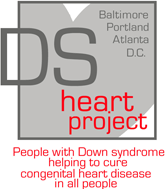 |
DS HEART PROJECT
- 40% of children born with Down syndrome (or trisomy 21) have a congenital
heart defect (CHD).
- The most common form of CHD in Down syndrome is an atrioventricular septal
defect (or AVSD)
- Children with Down syndrome are 2000 times more likely to have a complete
AVSD than children without Down syndrome
- Researchers are conducting a multi-site study to identify genetic risk
factors for congenital heart defects in people with Down syndrome.
Who can participate in this study?
- Individuals with Down syndrome and a complete AVSD under the age of 18,
and their parents
- Individuals with Down syndrome who were born with no
heart defect and their parents may participate as control
subjects
Participants in this study will be asked to:
- Sign a consent form
- Provide access to medical records such as a chromosome report and echocardiograms
- Give blood samples from the person with Down syndrome about 2 tablespoons
from adolescents and about 1 teaspoon for smaller children. Children’s
blood samples may be taken at the time of routine blood work.
- Give saliva samples from the parents of the child with Down syndrome
- Complete telephone questionnaires (30-45 minutes) that covers health history,
family health history, and environmental exposures.
Who is funding
this study?
- The study is funded by the National Institutes of Health (NIH).
How will you protect my privacy?
- Information you give us during the interview, as well as lab results from
the samples you provide, will be kept confidential.
- Numbers instead of names will be used to identify participants’ information.
- Personal information about you will not be available to anyone outside
this study.
- We will never use your name or your family’s name in any report or
publication.
How is this study designed?
- Down syndrome is caused by an extra chromosome 21. The purpose of
this study is to determine why some children born with Down syndrome have
a heart defect, while others do not.
- CHD is the most common birth defect in people. Findings in this project
will help us to understand CHD in all children.
- We will collect blood samples from children with Down syndrome with or
without a heart defect and saliva samples from their parents. DNA will
be isolated from the samples.
- We will compare DNA from families of children with a heart defect to DNA
from families of children without a heart defect. By comparing the DNA
we can identify genes that may play a role in the development of heart defects.
- We will use questionnaire information to identify environmental factors
that influence a gene’s ability to cause heart defects.
- We will make study results available to physicians, scientists, and all
interested families.
What is a complete atrioventricular septal defect?
- The human heart is divided into four chambers – the left and right
atria and the left and right ventricles - by a combination of septa (partitions)
and valves.
- This heart structure ensures that blood entering the heart from the body
is pumped to the lungs to pick up oxygen, returned to the heart,
and pumped back to the body for oxygen delivery.

- Efficient heart function
is dependent upon the heart structures developing properly before
birth.
- An atrioventricular septal defect (AVSD) occurs when both septa and both
valves do not develop properly. The resulting underdeveloped heart has difficulty
pumping oxygen-carrying blood to the rest of the body. This heart
defect requires surgical repair.
[printer-friendly brochure]
Participate!
If you are interested in participating or have questions, please contact any of us.
Tracie Rosser, Ph.D.
Emory University
Atlanta, Georgia
Research Project Coordinator
404-778-8474
trosser@emory.edu
|
Kay
Kennedy Krieger Institute
Baltimore, Maryland
Research Coordinator
443-923-9131;
800-873-3377 ext. 9131
|
|
 |




